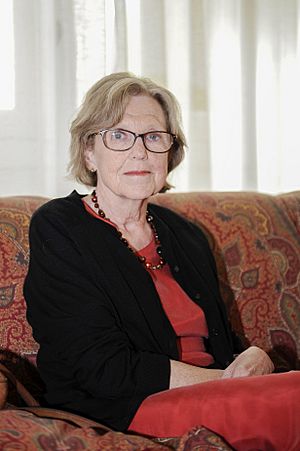Georgina Mace facts for kids
Quick facts for kids
Dame Georgina Mace
|
|
|---|---|

Georgina Mace in 2019
|
|
| Born |
Georgina Mary Mace
12 July 1953 London, England
|
| Died | 19 September 2020 (aged 67) |
| Education | City of London School for Girls |
| Alma mater |
|
| Known for | Developing the criteria for listing species in the IUCN Red List |
| Spouse(s) | Roderick O. Evans |
| Children | one son, two daughters |
| Awards |
|
| Scientific career | |
| Fields | Conservation Biology |
| Institutions | |
| Thesis | The evolutionary ecology of small mammals (1979) |
| Doctoral advisor | Paul H. Harvey |
Dame Georgina Mary Mace (born July 12, 1953 – died September 19, 2020) was an important British scientist. She was an ecologist and a conservation scientist. This means she studied how living things interact with their environment and how to protect them.
Georgina Mace was a professor at University College London. She also worked at Imperial College London. Before that, she was the Director of Science at the Zoological Society of London. She spent her career helping to protect animals and plants around the world.
Contents
Georgina Mace's Early Life and Schooling
Georgina Mace was born in London, England. Her father was a doctor, and her mother was a nurse. She went to the City of London School for Girls.
After school, she studied at the University of Liverpool. She earned a Bachelor of Science degree in 1976. Later, she got her PhD from the University of Sussex in 1979. Her PhD research was about the ecology of small mammals.
Georgina Mace's Research and Career
Georgina Mace was very interested in how many different kinds of life (called biodiversity) were being lost. She also studied how these changes affected our planet's ecosystems. An ecosystem is like a community of living things and their environment.
She started her career by studying how inbreeding affects animals in zoos. She wanted to make sure zoo animals stayed healthy. She said it was exciting to use science to help with conservation.
Leading Conservation Efforts Globally
Georgina Mace was a leader in many scientific groups. She was the President of the British Ecological Society. She also led the Society for Conservation Biology.
In 2000, she became the Director of Science at the Institute of Zoology. Here, she played a huge role in creating new rules for the IUCN Red List. The Red List is a list of species that are at risk of disappearing forever.
Before her work, the Red List was based on what experts thought. Georgina Mace and her team changed this. They made it so the list was based on real scientific data. This change took 10 years to put into place. Now, the Red List helps us understand threats like climate change to species.
Measuring Biodiversity and Ecosystem Services
Since 2002, Georgina Mace worked on ways to measure biodiversity. She also looked at "ecosystem services." These are the benefits nature gives us, like clean air and water. She helped create the Red List Index to track changes in biodiversity.
She was also involved in the "Millennium Ecosystem Assessment." This was a big project from 2002 to 2005. It looked at the health of the world's ecosystems. Georgina Mace believed that if people worked together, they could solve big environmental problems.
After 2012, she directed the Centre for Biodiversity and Environment Research at University College London. She also supported making scientific research available to everyone for free.
In 2018, she joined a committee that advised the UK government. This committee helped plan how to deal with the effects of climate change.
Honours and Awards for Georgina Mace
Georgina Mace received many important awards for her work.
- In 1998, she was made an Officer of the Order of the British Empire (OBE).
- In 2007, she became a Commander of the Order of the British Empire (CBE).
- In 2016, she was made a Dame Commander of the Order of the British Empire (DBE). This is a very high honour.
She was also elected a Fellow of the Royal Society in 2002. This is a group of the most important scientists in the UK.
She received honorary degrees from the University of Sussex and the University of Lausanne. In 2007, she won the International Cosmos Prize. In 2016, she won the Dr A.H. Heineken Prize for Environmental Sciences. She also won the Linnean Medal in 2016.
She received the President's Medal from the British Ecological Society. In 2018, she won the BBVA Foundation Frontiers of Knowledge Award. This award recognized her work in creating tools to help stop species from being lost.
An extinct type of rice rat from Barbados was named after her: Megalomys georginae. This shows how much her work was valued.
 | Audre Lorde |
 | John Berry Meachum |
 | Ferdinand Lee Barnett |

